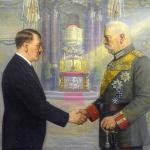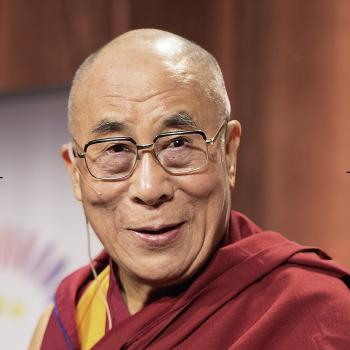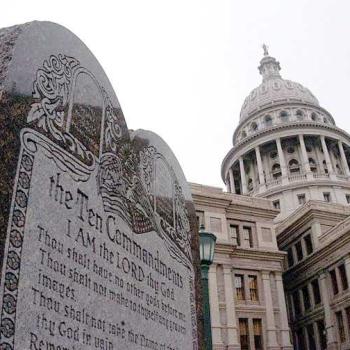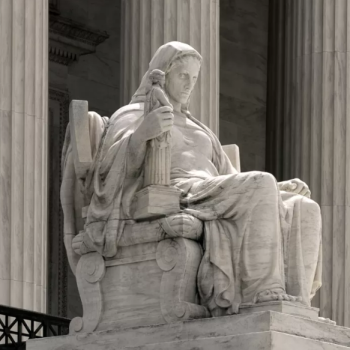Most Americans might agree that religious freedom is a cornerstone of American liberty. Yet we seem to be confused about what “religious freedom” means.
For example, President Donald Trump recently announced the creation of a task force to eradicate anti-Christian bias. “My Administration will not tolerate anti-Christian weaponization of government or unlawful conduct targeting Christians,” Trump said in the announcement. “The law protects the freedom of Americans and groups of Americans to practice their faith in peace, and my Administration will enforce the law and protect these freedoms. My Administration will ensure that any unlawful and improper conduct, policies, or practices that target Christians are identified, terminated, and rectified.”
That’s fine, but at the same time there are many news stories in circulation that accuse the Trump Administration of targeting Christian groups. See, for example “MAGA ramps up attacks on US Christian groups” by Jeff Brumley, Baptist News Global, February 3. At the same time, former Trump adviser Michael Flynn and current Trump adviser Elon Musk are practically waging war on Lutheran Services in America, a network of 300 Lutheran health and human service organizations within the U.S. that has long been recognized as one of the nation’s top nonprofits. Elon Musk has accused the Lutherans of money laundering (with no evidence) and wants to cut off all “illegal” (in his view) grants awarded to the charity. Perhaps the President’s new task force should begin by investigating Elon Musk. But I suspect it won’t.
Freedom of Religion in the U.S.
Freedom of religion is the first right of citizens enshrined in the Bill of Rights of the Constitution. The chief author of the Bill of Rights was James Madison, who served as our nation’s fourth president, from 1809 to 1817. Madison had firm views on what “religious freedom” means, and I wrote about this at some length in an earlier post, “James Madison and Religious Liberty.” Madison especially opposed the common practice, in his day, of state governments adopting a particular Christian denomination as the “official” religion, a practice called “establishment” of religion. Madison saw that religious establishment encouraged discrimination against other denominations. In some states, preachers who were not ordained in the established denomination could run afoul of the law by preaching or officiating at an unsanctioned church service. In Madison’s Virginia, Baptists in particular were often harassed for not being properly Episcopalian.
Madison believed that religion should be a matter of personal conscience, freely chosen, and not something people are forced to join or indoctrinated into. Religious freedom requires that government show no sectarian favoritism whatsoever. Government should not be hostile to religion, but it must never favor one denomination or sect or tradition over another.
Further, he warned that if government has the authority to favor your religion over others, it also has the authority to favor another religion over yours. This seems obvious, but over the years I have noticed that many Christians who want, say, prayers in public schools don’t understand that the school might introduce prayers they don’t like. The recent Louisiana “Ten Commandments” law that I wrote about last year mandated posting a particular version of the Ten Commandments in all schools in the state. The people who objected most were Jewish rabbis and some Christian ministers who disagreed with the state’s “official” version of the Ten Commandments and didn’t want it taught to their children.
The Dance of Church and State
Since the Constitution went into effect in 1789, state and federal governments in the U.S. have struggled to maintain the right balance of fairness and impartiality to religion. In a nation that has been overwhelmingly Christian, and Protestant, sectarian favoritism has been hard to avoid. And when the courts have reigned in government-sponsored religious practices, such as classroom prayers in public schools, Christians often take offense and interpret such decisions as an oppression of Christianity. But more often than not the plaintiffs in these cases are themselves religious people, including Christians, who found government-enforced religious observances oppressive and in violation of their religious freedom.
Then in 2001 the newly elected President George W. Bush established a faith-based initiative that made it easier for religious charities and service organization to receive government funding and grants. The government often partnered with private charities; it could partner with religious charities as well. As I remember there was some grumbling at the time that this was too much entanglement of church and state. But on the whole President Bush’s initiative turned out well, and it resulted in much good work that has benefited countless people. Subsequent presidents allowed it to continue. (For an interesting perspective, see “The Life and Times of the Faith-Based Initiative” by Tevi Troy in Mosaic magazine, February 13, 2023.)
The Politicization of Christian Charity
It appears the new Trump Administration is making distinctions between Christian charity it approves of and Christian charity it doesn’t. Anti-abortion activism is encouraged, although I don’t know if anyone has received any grants for such activism. Providing food and shelter for homeless people who might be migrants is not. And those religious charities the President does not like are not just being defunded; they are being smeared.
For example, when the U.S. Conference of Catholic Bishops criticized the administration’s immigration policies, Vice President J.D. Vance — a convert to Catholicism — questioned the Bishops’ motivations. “I think that the U.S. Conference of Catholic Bishops needs to actually look in the mirror a little bit and recognize that when they receive over $100 million to help resettle illegal immigrants, are they worried about humanitarian concerns? Or are they actually worried about their bottom line?” the Vice President said. (The Bishops responded here.) Still, that’s a bit mild compared to the smearing of a Lutheran charity as a front for money laundering. It is troubling that administration officials (and whatever Elon Musk is) cannot just disagree with a religious organization’s views. The organization must also be smeared and demonized.
Michelle Boorstein of the Washington Post (“Attacks on Catholics, Lutherans suggest new Trump approach on religion,” Feb. 8) notes that the administration’s sudden cutting of already appropriated grants and funds has hit Christian charities hard. These include World Relief, the country’s largest evangelical refugee resettlement program, which suddenly has an $8 million shortfall.
But the exclusive concern for “anti-Christian bias” coming from the White House also seems off. “According to FBI statistics of religion-related hate crimes in 2023, 8 percent were against Christians, 60 percent were against Jews and 13 percent were against Muslims,” Boorstein writes. It appears that instead of being fair and impartial to all religions, the Trump Administration clearly favors some religions over others. This is what James Madison warned us not to do. This is how religious freedom is destroyed.














